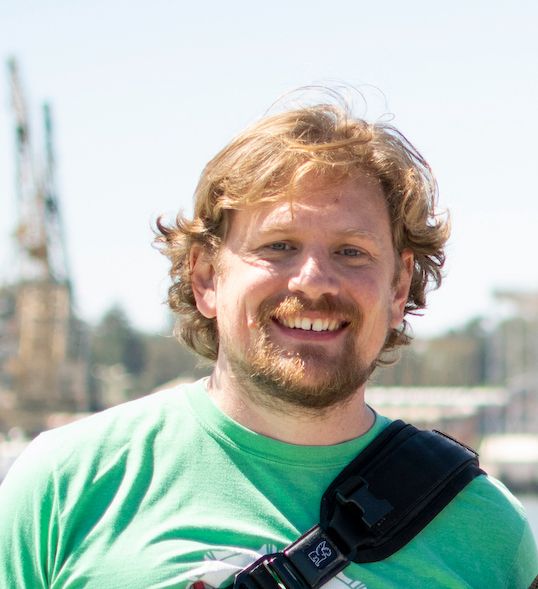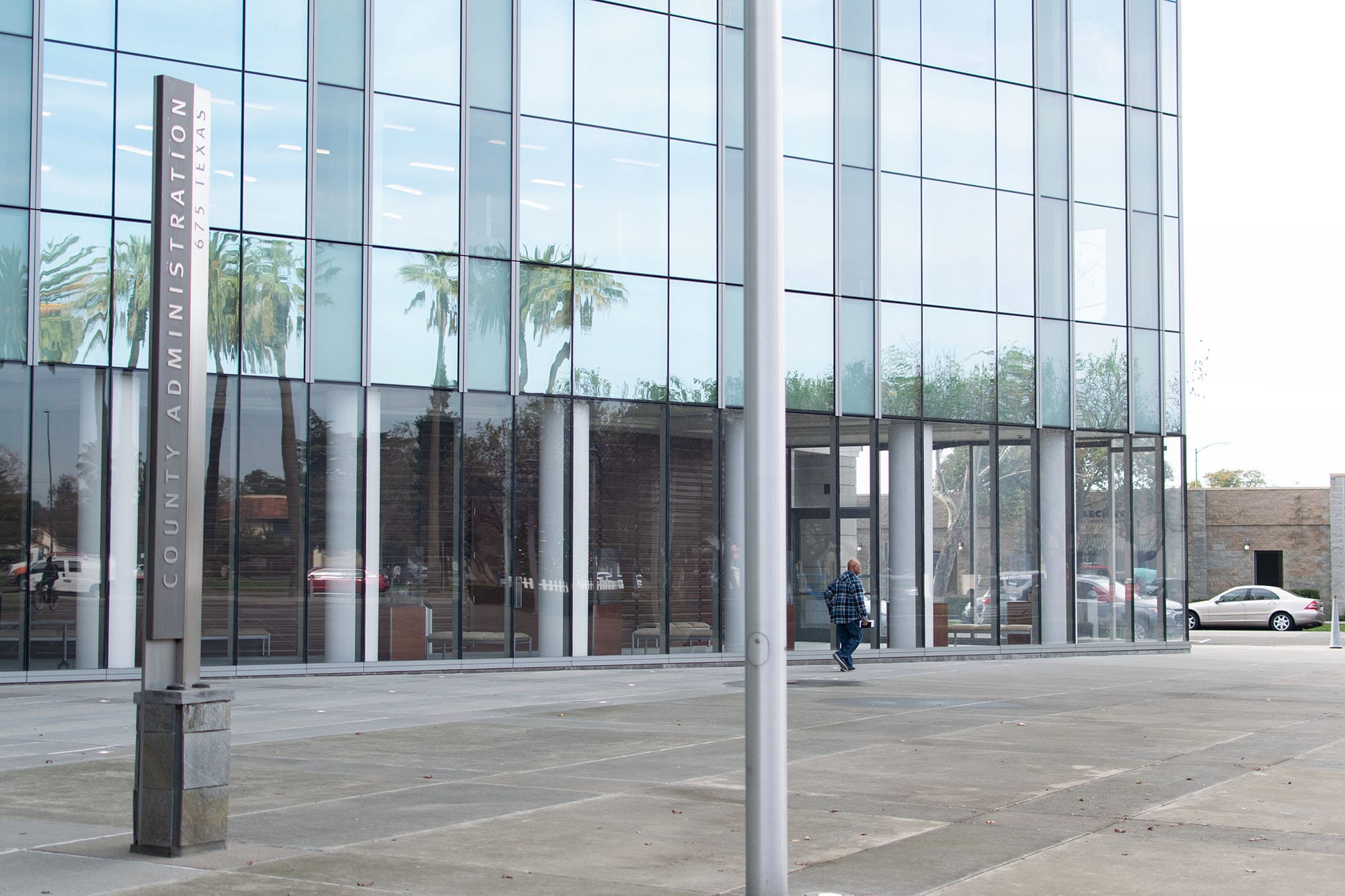VALLEJO – A former Vallejo police lieutenant testified in court Tuesday that he started the controversial “badge bending” practice while he was an officer in the Concord Police Department more than 20 years ago and brought it to Vallejo when he joined the force in 2003.
Former Lt. Michael Kent Tribble, who retired from the department last year, testified Tuesday during a criminal case in Solano County Superior Court that he and another officer in Concord came up with the idea for officers to bend their badges following a shooting. After he came to Vallejo in 2003, Tribble said he personally bent the badges of at least six Vallejo police officers after they were involved in shootings.
The testimony emerged in the case of Dominic Milano, who was fired on by Officer Matthew Komoda and two other Vallejo officers after a pursuit into Oakland in 2018. Milano survived the shooting and is charged with attempted murder of Komoda. Komoda testified that there was no badge bending with regard to Milano.
Tribble clarified during his testimony Tuesday that the practice was not specific to fatal shootings and badges were bent for any officers who were involved in shootings. “I think it was a way to signify the fact that we would stand up and do our job,” Tribble testified.
Tribble bent the badges belonging to Komoda and Officer David McLaughlin following a 2016 incident when they fired into a vehicle. He testified that he also bent Officer Josh Coleman’s badge and that Coleman bent Officer Zach Jacobsen’s badge in late 2017 or early 2018. Jacobsen shot and killed Angel Ramos in 2017 and was involved in another shooting along with four other officers later that year, but Tribble did not recall specifically which shooting Coleman bent Jacobsen’s badge for.
Tribble also acknowledged bending Lt. Sanjay Ramrakha’s badge in the early 2000s. Ramrakha has recently been an internal affairs investigator and is currently heading the department’s efforts to reform its use of force policy.
Coleman disputed Tribble’s account in testimony later in the day saying that he did not have any knowledge of badge bending after Tribble bent his badge following a shooting in 2013. He said when Tribble bent his badge he told him that he and his brother – police Capt. Todd Tribble – were the only ones who could bend someone’s badge.
Each of the badge bendings happened at the Relay Club, a bar across the street from Vallejo police headquarters where Tribble said that officers frequently gather.
The testimony provides the clearest look yet into the practice of badge bending. Former Sonoma County Sheriff Robert Giordano completed a report on the practice in September, but the city has refused to release it, saying it is an officer personnel record and exempt from public disclosure.
However, it is subject to release in criminal cases if its contents may aid in defense. Vallejo assistant city attorney Katelyn Knight said Tuesday that the full approximately 150-page report, including interview transcripts with officers, had been turned over to the Solano County District Attorney’s Office for potential disclosure in criminal cases.
While Tuesday’s testimony only scratched the surface of what is contained in the report, it revealed some inconsistencies in the officer statements. For example, Solano County Deputy Public Defender Nick Filloy said that Jacobsen told investigators that Detective Terry Poyser had bent his badge, not Coleman, leaving Filloy to wonder if Jacobsen’s had been bent twice.
Komoda also testified Tuesday, saying that he and McLaughlin were unaware of the practice when Tribble, who was a sergeant at the time, asked them to meet him at the Relay and to bring their badges. Tribble then asked them for their badges over beers, and he bent the tip of each with his hand, explaining that he was doing it because, “you were involved in a critical incident, you handled it professionally, and you came out OK.”
Komoda testified that both he and McLaughlin were unhappy that Tribble had done it and that they both bent the tips back after. But they did not bring it to the attention of superiors. Komoda said that he thought he was a “victim” of badge bending.
That characterization – which is among the conclusions in Giordano’s report – did not sit well with Superior Court Judge Daniel Healy. Healy said that he reviewed a draft of the report and spoke to Giordano in a private hearing and told him that conclusion was “insane.”
“That report astounds me,” Healy said, “It is a depressing and troubling characterization that besmirches 90% of the police officers.”
He said that the obligation for any officer involved was to undo it and, to the extent that it violates the rules of the department, report it.
Healy also questioned why the report had not yet been made public. “I think the community has suffered grievous harm,” Healy said. “The specter of silence just leaves the community wondering what happened here.”
Knight acknowledged that not even the Vallejo City Council – which had requested an update on the investigation – has been allowed to review the report. She said because of the city’s charter – which says that the city manager appoints a police chief to be in charge of the department – the council doesn't have a “legitimate need” to see the report.
Coleman, who was hired as a Napa County Sheriff’s deputy in 2018, said in court Tuesday that he did not agree to be interviewed for Giordano’s investigation after consulting with the sheriff's office and his attorney Michael Rains. He said that when his badge was bent after a 2013 shooting, which also involved then-Vallejo police Corporal Dustin Joseph, who has since joined the Fairfield Police Department, Tribble sent him a text message telling him to come to the Relay and bring his badge.
Coleman said that he was “afraid” of Tribble because of several incidents during his stint in Vallejo police. He said that as a 20-year-old cadet on his first ridealong, Tribble put a gun to his head because he didn’t put his seatbelt on. But he said he never reported the conduct. He said Tribble was a “reckless” person.
Coleman said that following another shooting in 2014, when Coleman shot a man out of the window of his patrol car, Tribble grabbed him and shook him saying, “you stole my dinner,” meaning that Tribble wanted to be the one who shot the suspect.
Coleman said Tribble was an alcoholic who would come to work with his hands shaking and had the nickname “John Wayne.”
Regarding Komoda and McLaughlin, Tribble testified that following an Aug. 31, 2016, incident — when they shot at a moving vehicle — he felt that they felt bad that their rounds had not penetrated the car door and thought it was an issue with training. Specifically, he said that they had been trained to shoot at “center mass” but should have been trained to shoot at what was visible so they weren’t shooting through metal.
“To get them to feel a little more positive about that engagement I bent their badges,” Tribble said.
But Komoda said that he didn’t recall having felt that way, didn’t have any tactical concerns about the shooting and didn’t know why Tribble bent their badges. He said that he didn’t know about the wider practice of badge bending until it was revealed in news reports in July 2020.
Tribble — who had a history so violent in the Vallejo Police Department that prosecutors nicknamed him “Captain Taser” — was promoted to lieutenant in 2016 and following that he tried not to be involved in badge bending anymore, saying that he was “trying to be a little better role model.” Shortly after his promotion, he testified that Capt. Lee Horton confronted him about badge bending, looking at him in his office and saying, “what’s wrong with your badge” and “I know what that is and I don’t want to see it again.”
Tribble said he was confused because he was wearing his lieutenant’s badge, which was not bent, but he realized that Horton was probably telling him to end the practice of badge bending.
Tribble testified that Coleman asked Tribble to meet him at the Relay and when he got there, Coleman bent Jacobsen’s badge. “This is another place where I feel like I failed as a leader,” Tribble said. “What I should have done is say we don’t do that anymore."
Coleman said under oath that it was false that he had ever bent anyone’s badge.
Later, Horton confronted Tribble again, telling him to get into his office where he said, “Listen, no bullshit, I want to talk about the badge bending and I don’t want to hear no bullshit excuses,” according to Tribble.
But Tribble later acknowledged even bending his lieutenant’s badge. He said that he was having a hard time at that point in his career – including getting into a fist fight in Bend, Oregon – and when he was drinking and angry at Horton, he bent his badge. “If they’re going to accuse me of having a bent badge I’m going to bend it,” Tribble said.
Editor's note: This story has been updated with information from the afternoon's testimony.
Correction: This story has been updated to correct the date of the Vallejo police pursuit of Dominic Milano.
Before you go...
It’s expensive to produce the kind of high-quality journalism we do at the Vallejo Sun. And we rely on reader support so we can keep publishing.
If you enjoy our regular beat reporting, in-depth investigations, and deep-dive podcast episodes, chip in so we can keep doing this work and bringing you the journalism you rely on.
Click here to become a sustaining member of our newsroom.
THE VALLEJO SUN NEWSLETTER
Investigative reporting, regular updates, events and more
- policing
- Vallejo
- Vallejo Police Department
- Kent Tribble
- Badge bending
- Solano County Superior Court
- courts
- Dominic Milano
- Nick Filloy
- Katelyn Knight
- Matthew Komoda
- David McLaughlin
- Zachary Jacobsen
- Angel Ramos
- Relay Club
- Rob Giordano
- Terry Poyser
- Daniel Healy
- Vallejo City Council
- Sanjay Ramrakha
- Todd Tribble

Scott Morris
Scott Morris is a journalist based in Oakland who covers policing, protest, civil rights and far-right extremism. His work has been published in ProPublica, the Appeal and Oaklandside.
follow me :




